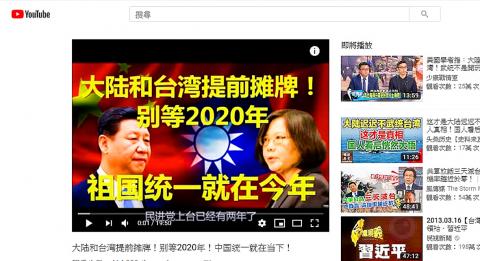China has been creating fake social media accounts to interfere with the Nov. 24 elections as practice for manipulating the 2020 elections to elect candidates favorable toward Beijing, a National Security Bureau source said on Saturday.
China’s fake news is largely centered on issues related to Taiwan’s defense, cross-strait relations and the policies of President Tsai Ing-wen’s (蔡英文) administration, and generally gets published first by Chinese outlets such as the Global Times, Straits Today (今日海峽) and Taihai Net (台海網), the source said.
The content is then edited by the Chinese People’s Liberation Army’s (PLA) cyberwarfare division or the 50 Cent Army — Internet users paid to support Beijing’s propaganda online — and reposted to PTT — Taiwan’s largest online bulletin board system — the Line messaging app, YouTube and other social media platforms, the source said.

Photo: Screen grab from the Internet
There are a growing number of Chinese accounts aimed at Taiwan on YouTube, such as Jianghu Baixiaosheng (江湖百曉生) and Touhao Zhanjiang (頭號戰將), which both have nearly 30,000 Taiwanese followers, the source said.
These accounts have each published nearly 1,000 videos in the six months they have been active, and the content is largely commentary critical of Tsai and US President Donald Trump sourced from the Global Times, the source added.
Some of the videos on Jianghu Baixiaosheng, including one advocating a PLA takeover of Taiwan, have been shared on Facebook by Taiwanese users, the source said.
China’s information warfare efforts are an evolution of a PLA unit that was established at the end of 2015 to conduct intelligence gathering, attacks on servers and networks, cognitive hacking and psychological warfare, the source said, adding that the branch today has an estimated 300,000 personnel.
Taiwan has long been a testing ground for Chinese cyberattacks, and last year the bureau intercepted an average of 100,000 online attacks from China per month, the source said.
China’s cyberwarfare specialists are familiar with social issues in Taiwan and inject divisive commentary into discussions on controversial topics in an attempt to create social strife, the source said, citing the fake story about Chinese consulate officials helping Chinese passengers stranded at Osaka’s Kansai International Airport following Typhoon Jebi.
Bureau Director-General Peng Sheng-chu (彭勝竹) on Thursday told a meeting of the Legislative Yuan’s Foreign Affairs and National Defense Committee that Beijing and the PLA were behind a propaganda campaign to interfere with the nation’s democratic elections by creating disinformation and fake news targeting Taiwanese media outlets, radio and television programs and Web sites, Peng said.
Premier William Lai (賴清德) on Friday told an inter-ministerial meeting at the Executive Yuan that this month’s elections were being undermined because of China’s spread of disinformation, financial support of certain candidates and sponsoring of television and radio programs, as well as cyberattacks.

Taiwan Semiconductor Manufacturing Co (TSMC, 台積電) is expected to start construction of its 1.4-nanometer chip manufacturing facilities at the Central Taiwan Science Park (CTSP, 中部科學園區) as early as October, the Chinese-language Liberty Times (the Taipei Times’ sister newspaper) reported yesterday, citing the park administration. TSMC acquired land for the second phase of the park’s expansion in Taichung in June. Large cement, construction and facility engineering companies in central Taiwan have reportedly been receiving bids for TSMC-related projects, the report said. Supply-chain firms estimated that the business opportunities for engineering, equipment and materials supply, and back-end packaging and testing could reach as high as

CHAMPIONS: President Lai congratulated the players’ outstanding performance, cheering them for marking a new milestone in the nation’s baseball history Taiwan on Sunday won their first Little League Baseball World Series (LLBWS) title in 29 years, as Taipei’s Dong Yuan Elementary School defeated a team from Las Vegas 7-0 in the championship game in South Williamsport, Pennsylvania. It was Taiwan’s first championship in the annual tournament since 1996, ending a nearly three-decade drought. “It has been a very long time ... and we finally made it,” Taiwan manager Lai Min-nan (賴敏男) said after the game. Lai said he last managed a Dong Yuan team in at the South Williamsport in 2015, when they were eliminated after four games. “There is

POWER PLANT POLL: The TPP said the number of ‘yes’ votes showed that the energy policy should be corrected, and the KMT said the result was a win for the people’s voice The government does not rule out advanced nuclear energy generation if it meets the government’s three prerequisites, President William Lai (賴清德) said last night after the number of votes in favor of restarting a nuclear power plant outnumbered the “no” votes in a referendum yesterday. The referendum failed to pass, despite getting more “yes” votes, as the Referendum Act (公民投票法) states that the vote would only pass if the votes in favor account for more than one-fourth of the total number of eligible voters and outnumber the opposing votes. Yesterday’s referendum question was: “Do you agree that the Ma-anshan Nuclear Power Plant

Democratic nations should refrain from attending China’s upcoming large-scale military parade, which Beijing could use to sow discord among democracies, Mainland Affairs Council Deputy Minister Shen You-chung (沈有忠) said. China is scheduled to stage the parade on Wednesday next week to mark the 80th anniversary of Japan’s surrender in World War II. The event is expected to mobilize tens of thousands of participants and prominently showcase China’s military hardware. Speaking at a symposium in Taichung on Thursday, Shen said that Chinese Minister of Foreign Affairs Wang Yi (王毅) recently met with Indian Prime Minister Narendra Modi during a visit to New Delhi.